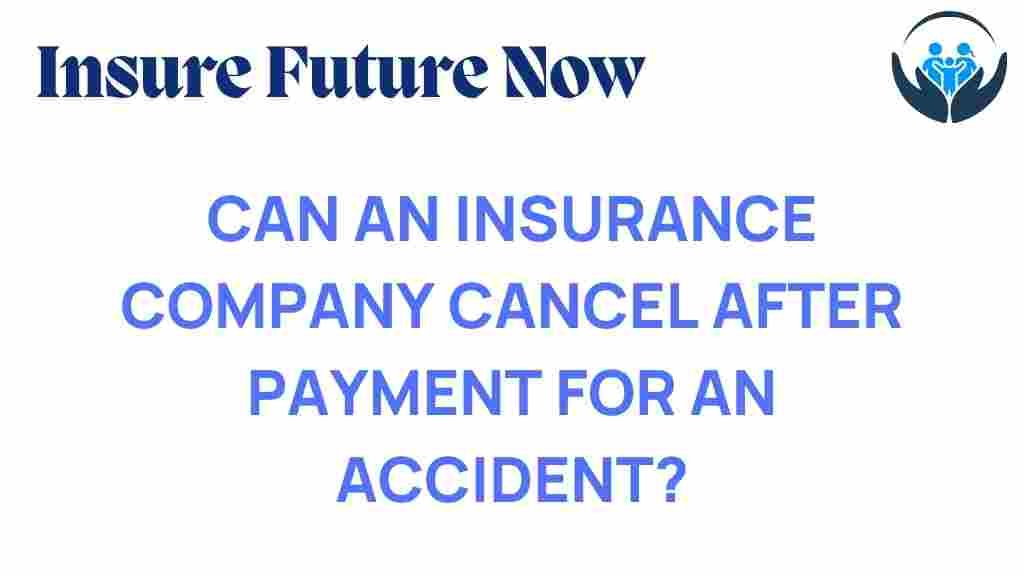Can Your Insurance Be Canceled After an Accident? What You Need to Know
When it comes to auto insurance, understanding your coverage rights is crucial, especially after an accident. Many drivers often worry about the possibility of insurance cancellation following an accident claim. Navigating the intricacies of policy terms, premium payments, and legal obligations can be daunting. In this article, we will explore whether your insurance can be canceled after an accident, the factors that influence this decision, and what you need to know to protect yourself.
Understanding Insurance Cancellation
Insurance cancellation refers to the termination of an insurance policy by the insurer or the policyholder. It is important to understand the circumstances under which your insurance can be canceled, especially after an accident. Here are some key points to consider:
- Types of Cancellation: There are two types of cancellation: voluntary (initiated by the policyholder) and involuntary (initiated by the insurer).
- Reasons for Cancellation: Insurers can cancel policies for various reasons, including non-payment of premiums, fraudulent claims, or significant changes in risk factors.
- Legal Obligations: Insurers must follow state laws regarding cancellation, which often require them to provide notice before terminating a policy.
Can Your Insurance Be Canceled After an Accident?
The short answer is yes, your insurance can be canceled after an accident, but it largely depends on several factors:
- Nature of the Accident: If the accident involved illegal activity or was a result of reckless behavior, the insurer might have grounds for cancellation.
- Claims History: Frequent claims can lead to higher risk assessments by your insurer, potentially resulting in cancellation.
- Policy Violations: If you violated any terms of your insurance policy, such as not reporting an accident or providing false information, your insurer may cancel your policy.
- State Regulations: Different states have different regulations regarding cancellation policies. Familiarize yourself with the laws in your state to understand your rights.
Steps to Take After an Accident
If you find yourself in an accident, here’s a step-by-step process to help protect your insurance coverage:
- Report the Accident: Always report the accident to your insurer promptly, as failure to do so can lead to cancellation.
- Document Everything: Gather evidence, including photos, witness statements, and police reports, to support your claim.
- Review Your Policy Terms: Understand the specific terms and conditions of your policy regarding claims and cancellations.
- Follow Up with Your Insurer: Keep communication lines open with your insurance provider to stay informed about your claim status.
What to Do If Your Insurance Is Canceled
If your insurance has been canceled, here are some troubleshooting tips to address the situation:
- Request a Written Explanation: Ask your insurer for a detailed explanation of why your policy was canceled.
- Check for Errors: Review your policy documents for any inaccuracies that may have led to the cancellation.
- Explore Reinstatement Options: Some insurers may allow you to reinstate your policy if you address the reasons for cancellation.
- Consider Alternative Providers: If reinstatement is not an option, shop around for other insurance providers who may offer coverage.
- Understand Consumer Protection Laws: Familiarize yourself with consumer protection laws in your state that may safeguard your rights against unfair cancellations.
The Importance of Premium Payments
One of the primary reasons for insurance cancellation is non-payment of premiums. To maintain continuous coverage, consider the following:
- Set Up Automatic Payments: Consider setting up automatic payments to avoid missing deadlines.
- Notify Your Insurer of Financial Hardships: If you’re facing financial difficulties, communicate with your insurer to explore options.
- Understand Grace Periods: Many insurers offer grace periods for late payments before cancellation occurs; know your insurer’s policies.
Consumer Protection in Insurance Cancellation
Consumer protection laws play an essential role in safeguarding policyholders from unfair treatment. Here’s what you should know:
- Right to Appeal: If your policy is canceled, you typically have the right to appeal the decision.
- State Insurance Departments: Each state has an insurance department that regulates insurers; they can assist with disputes.
- Legal Representation: In some cases, seeking legal advice might be necessary to understand your rights and obligations.
Conclusion
Understanding the possibility of insurance cancellation after an accident is crucial for all drivers. By being aware of your coverage rights, adhering to policy terms, and keeping up with premium payments, you can significantly reduce the risk of losing your insurance coverage. Always remember to communicate openly with your insurer and know your legal obligations and consumer protections.
For more information on auto insurance and your rights, you can visit NAIC’s official site. If you have questions about specific incidents or need assistance, consider consulting with a legal expert specialized in insurance matters.
Stay informed, stay protected, and drive safely!
This article is in the category Policies and created by InsureFutureNow Team
